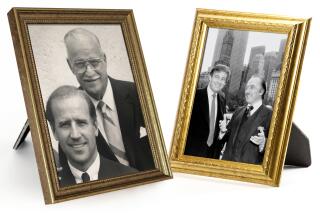Son Urges Good Deeds to Mark King Holiday
- Share via
Martin Luther King III, describing the man who he said was “first and foremost my father,” told a racially mixed crowd of about 500 at UC Irvine Tuesday night that the anniversary of the birth of Martin Luther King Jr. would be best observed fasting, feeding the hungry, cleaning neighborhoods and bringing people together.
The elder King’s birthday will be celebrated for the first time Monday as a federal holiday, although today is the anniversary of King’s birth. Throughout the country, events and observances are taking place in the week leading up to the holiday.
“We’re not going to let it be just another holiday,” said King, 28, in an address at UCI’s second annual Martin Luther King Jr. symposium, a three-day event.
King, the second of the slain civil rights leader’s four children, was 10 years old when his father was assassinated in 1968.
Frequently referring to him as “Daddy,” King said his father did not seek leadership of what became the civil rights movement. But once it was thrust on him, his father did not shrink from “putting the nation on trial.”
As a child, King said, “I can’t say I totally understood what he was doing.” When schoolmates said his father was a “jailbird,” his mother, Coretta Scott King, explained that the younger King’s father “was going to jail to make this a better place for all God’s children.”
A political science and history major when he attended Morehouse College in Atlanta, King works as a fund-raiser for the Martin Luther King Jr. Center for Nonviolent Social Change. Along with two of his sisters, King was arrested on Jan. 9 in Atlanta during a protest at a supermarket accused of doing business with South Africa.
If his father were alive today, King said, “he’d be challenging South Africa.” He accused the Reagan Administration of operating under “double standards” when it came to the issue of responding to terrorism with economic sanctions, as in the case of Libya.
“We need to recommit ourselves to the dream,” King said, and help build the “beloved community” his father had called for.
King also called on the audience to eschew drug use. “If you love yourself,” he said, “don’t contaminate your body.”
He also urged them to exercise their right to vote, beginning with campus elections. The franchise, he said, is precious. “People died so we would have that right,” he said.
In the 1980s, King said, “we still have some of the same problems we had in 1968,” when his father was shot in Memphis, Tenn., while speaking in support of striking sanitation workers. Because the social and economic agenda has “moved only at a snail’s pace” since then, he charged, more people live in poverty now in the United States than in 1968.
While “there are no easy solutions to poverty,” King said, one of the difficulties is that “we spend so much on death and defense” and “not enough on life.” Billions of dollars is being spent, he said, “in the interest of maintaining our superiority. What good is it doing?” “We’ve got a challenge before us,” he told the audience. In an era that emphasizes competition, individuals must learn to compete, he said, but “not to the point where we mistreat others.”
After his remarks, King presented framed lithographs depicting scenes from his father’s life to winners of an essay contest sponsored by the UCI symposium on the subject “What Does ‘Living the Dream’ Mean to You?” The symposium concludes today with a march from William R. Mason Regional Park to the UCI campus at 10 a.m., followed by an interfaith memorial service and a birthday celebration.
More to Read
Sign up for Essential California
The most important California stories and recommendations in your inbox every morning.
You may occasionally receive promotional content from the Los Angeles Times.













